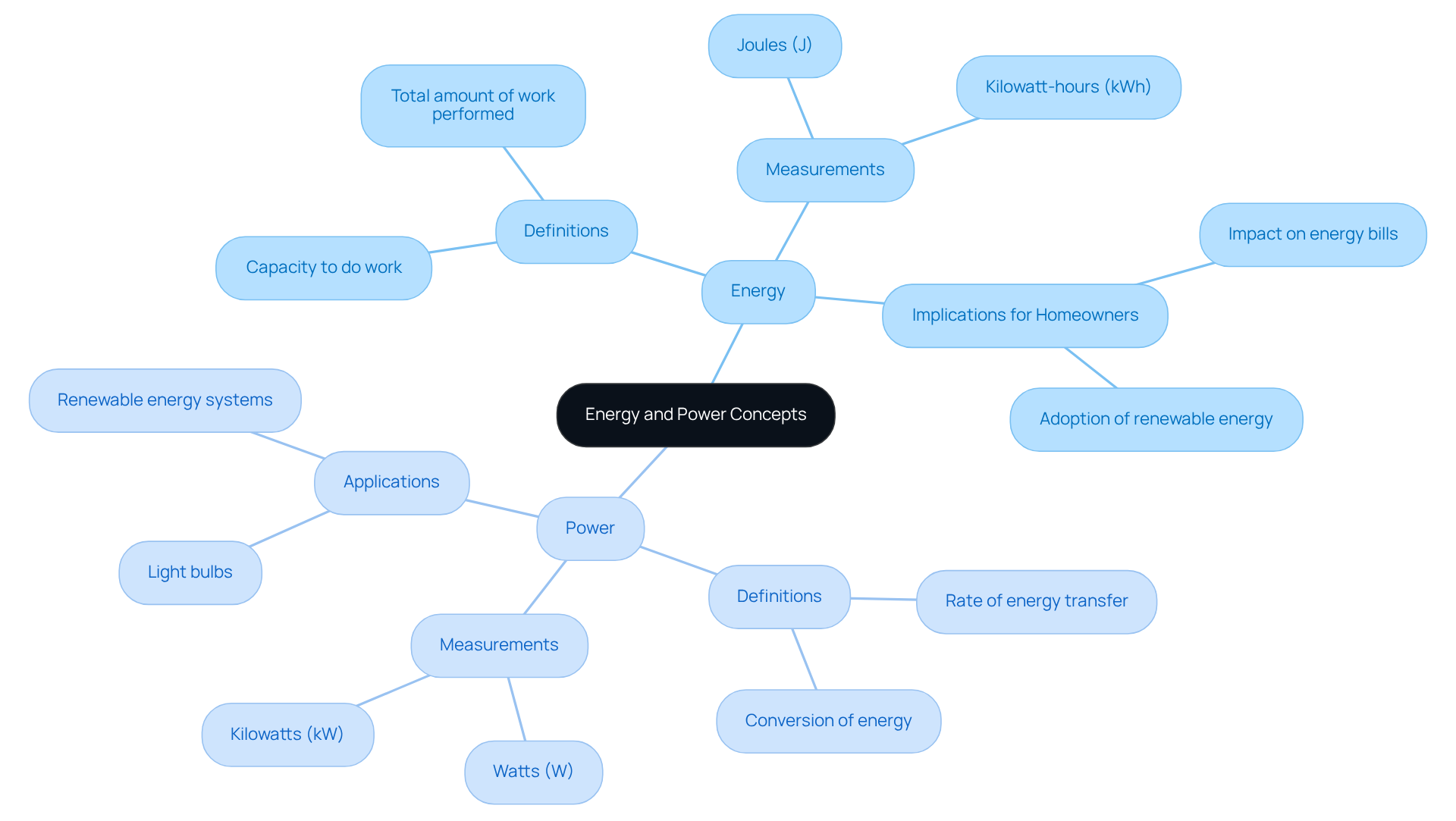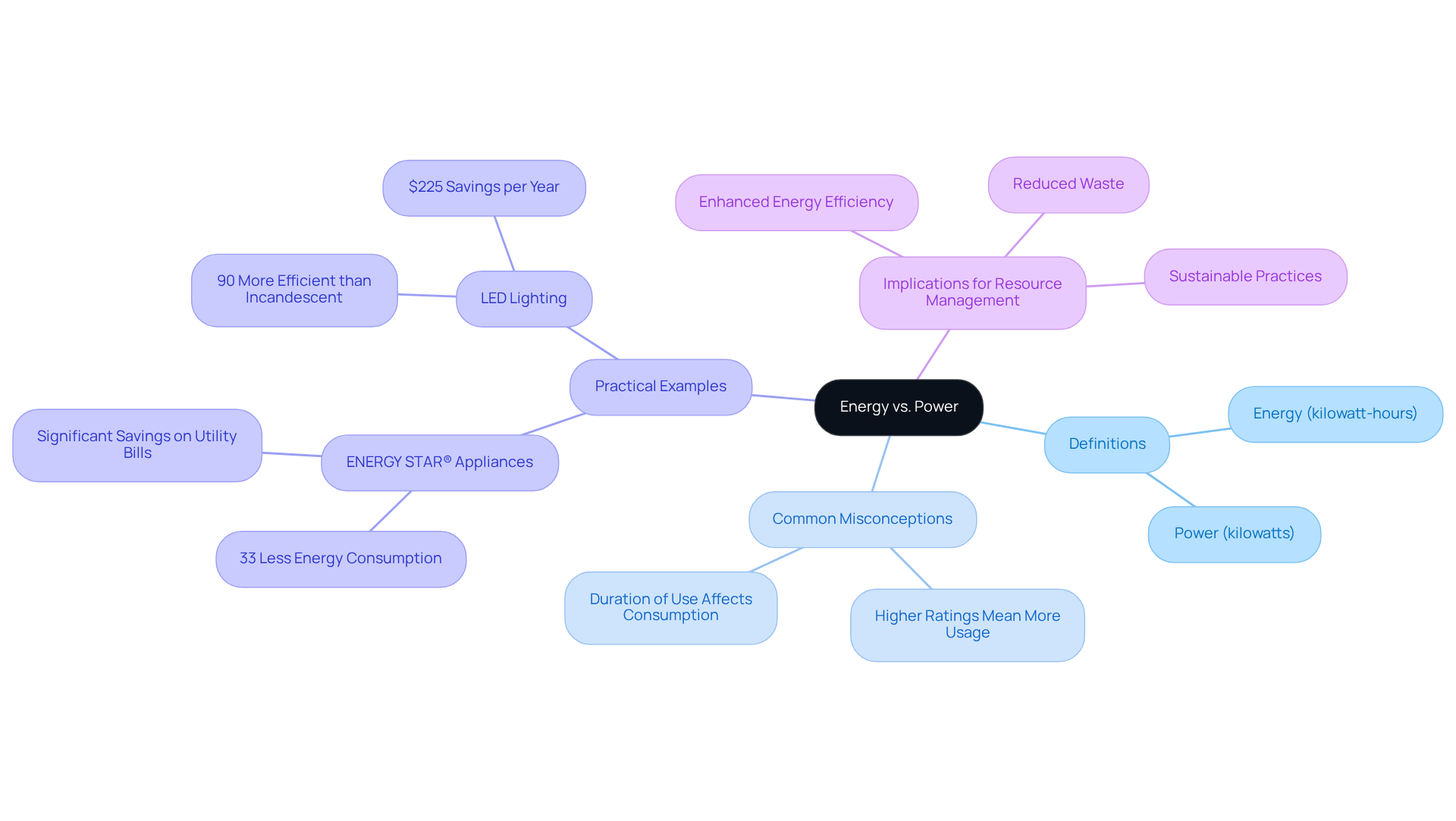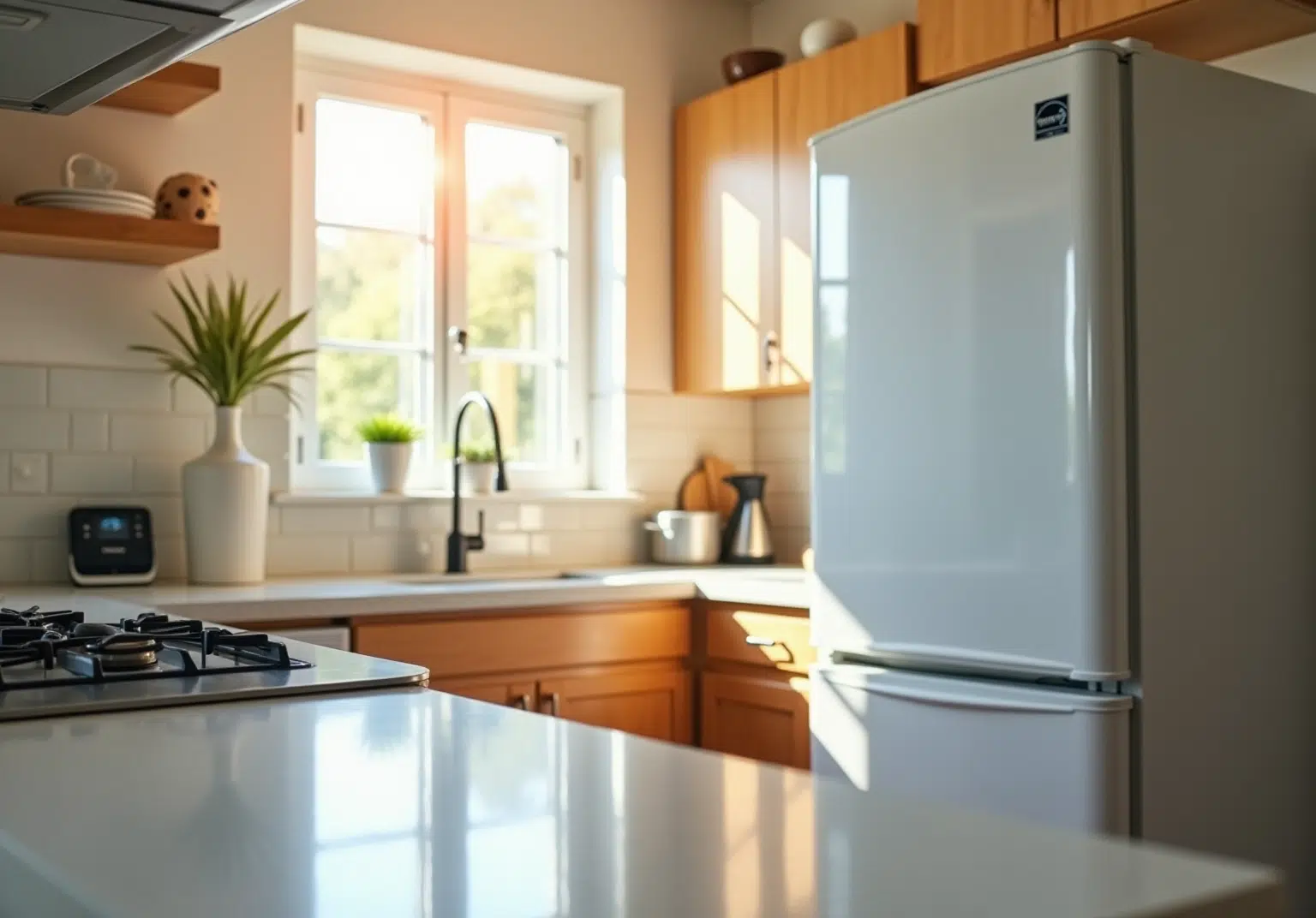Overview
We understand that navigating energy bills can be overwhelming for homeowners. It’s essential to grasp the difference between energy and power, as this knowledge can significantly impact your energy consumption and costs. Energy represents the total work done, measured in kilowatt-hours, while power indicates the rate of energy use, measured in kilowatts. By understanding this distinction, you can make informed decisions about energy-efficient appliances and explore renewable energy options.
Imagine the relief of lowering your utility bills by choosing the right solutions. Embracing energy efficiency not only helps you save money but also contributes to a sustainable future. Together, we can work towards energy independence, allowing you to take control of your energy usage and costs.
Let’s reflect on your current energy habits. Are there areas where you could improve efficiency? By considering these choices, you can lead your household towards significant savings and a greener lifestyle. We are here to support you every step of the way, guiding you toward solutions that best fit your needs. Your journey to energy efficiency starts with understanding, and we’re excited to help you along the way.
Introduction
Understanding the distinction between energy and power is crucial for homeowners who are understandably concerned about optimizing their utility bills and enhancing energy efficiency. Energy represents the total capacity to perform work, while power measures the rate at which that energy is consumed. This knowledge not only helps you make informed decisions about home appliances and renewable energy options but also empowers you to navigate the complexities of energy management.
We understand that many still grapple with misconceptions surrounding these concepts—how can you effectively harness this understanding to achieve both financial savings and sustainability in your home? Together, we can explore these ideas and find solutions that work for you.
Define Energy and Power: Core Concepts Explained
We understand that managing energy bills can be a significant concern for homeowners. Energy, defined as the capacity to do work or produce change, is measured in joules (J) or kilowatt-hours (kWh), representing the total amount of work that can be performed. In contrast, power is the rate at which vitality is transferred or converted, measured in watts (W) or kilowatts (kW). For instance, when a light bulb consumes 100 watts of electricity, it utilizes resources at that rate. Understanding the energy and power difference is crucial for property owners as it directly impacts resource usage and expenses in their homes.
In exploring renewable power options, understanding the connection between electricity and power can empower homeowners to make informed decisions about adopting photovoltaic systems, such as solar panels and battery storage solutions. Reflecting on your power requirements can assist in choosing the appropriate panel system and battery alternatives, enhancing efficiency and lowering expenses.
Moreover, with the growing economic and ecological advantages of heating systems that harness sunlight, residents can utilize this information to improve their energy autonomy and sustainability efforts. By incorporating solar solutions, like those provided by Powercore Electric, homeowners can effectively manage their power needs while protecting against rising utility costs. Together, we can work towards a more sustainable future, ensuring your home is both energy-efficient and cost-effective.

Explore Practical Implications: Energy vs. Power in Home Management
In home management, we recognize that the energy and power difference in energy bills can be a significant concern for many homeowners. Recognizing the difference between vitality and strength is essential for improving efficiency and achieving cost reductions. By effectively tracking the energy and power difference during peak hours, you can avoid the elevated rates imposed by utility companies. Additionally, understanding the energy and power difference of appliances over time is crucial when selecting efficient devices. For instance, a refrigerator that uses 200 kWh each month reflects a constant power consumption, which can be improved by choosing models with higher efficiency ratings.
When considering solar heating systems, it’s important to assess regional weather, household size, and hot water needs to determine the right capacity. We understand that budget considerations also play a vital role, as the initial investment can lead to long-term savings. Furthermore, ease of installation and maintenance, along with comprehensive warranties and reliable manufacturer support, are critical factors that ensure long-term satisfaction. This understanding empowers property owners to make informed decisions, promoting autonomy and lowering overall costs.
It’s common to feel overwhelmed, but specialists highlight that even minor changes in consumption habits can lead to considerable savings. Some property owners have noted decreases of up to 30% in their utility expenses after adopting management systems. By prioritizing energy and power difference alongside power efficiency and exploring sustainable solutions such as solar water heaters, together we can enjoy both financial advantages and a positive environmental impact. Let’s work towards a brighter, more sustainable future for our homes.
Clarify Misconceptions: Understanding the Distinctions Between Energy and Power
Homeowners often find themselves confused by the terms ‘energy and power difference,’ leading to misunderstandings in managing their resources. We understand that many believe a higher rating means increased resource consumption. However, it’s essential to recognize that electricity usage depends on both the strength of the device and the duration it is used. For instance, a device with a high power rating might consume less electricity than a lower-rated device if it operates for a shorter time. This differentiation is crucial for efficient resource management, aiding residents in understanding the energy and power difference to maximize their consumption while minimizing expenses.
Data indicates that many property owners struggle to grasp these concepts, which can hinder their ability to make informed decisions about energy efficiency. By understanding the energy and power difference between electricity (measured in kilowatt-hours) and power (measured in kilowatts), residents can more effectively evaluate their electricity usage habits.
Consider practical examples: homeowners who have transitioned to energy-saving appliances, such as ENERGY STAR® certified refrigerators, often report significant savings on their utility bills. These modern appliances typically consume an average of 33% less power than older models, illustrating how informed choices can lead to substantial cost reductions.
Ultimately, understanding the nuances of energy and power difference empowers homeowners to adopt strategies that enhance energy efficiency, reduce waste, and contribute to a more sustainable future. Together, we can work towards a greener tomorrow, ensuring that your home is not only comfortable but also environmentally friendly.

Conclusion
Understanding the distinctions between energy and power is crucial for homeowners who are concerned about rising energy bills and looking to optimize their consumption while managing costs effectively. By grasping these core concepts, you can make informed decisions that not only enhance your home’s efficiency but also contribute to its sustainability. The relationship between energy and power is not just an academic exercise; it has practical implications that can lead to significant financial savings and a reduced environmental footprint.
We understand that navigating these concepts can feel overwhelming. Energy is measured in joules or kilowatt-hours, while power is quantified in watts or kilowatts. Recognizing this difference allows you to track your energy usage more accurately and choose efficient appliances that contribute to lower utility bills. Additionally, exploring renewable energy options, such as solar panels, highlights how understanding these concepts can help you make choices that not only meet your current needs but also promote long-term sustainability.
Ultimately, the knowledge gained from understanding the difference between energy and power is a powerful tool for you as a homeowner. By adopting energy-efficient practices and exploring renewable energy solutions, you can take significant steps toward reducing your energy expenses and contributing to a greener future. Embracing these principles not only fosters financial savings but also empowers you to play a vital role in our collective effort toward environmental stewardship. Together, we can create a brighter, more sustainable future for ourselves and generations to come.


